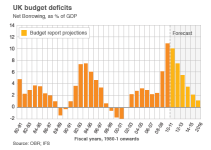They didn't pay the debt down at all. It makes sense to pay off some debt while your economy is booming. Obviously if your economy is booming, the debt is automatically lower as a % GDP, so for short term comparison that's the worst way to measure it, otherwise no one would ever feel the need to actually reduce it when times are good. Choosing to only pay off debt when it's rising as a percentage of GDP would mean you only pay off your debt when you're least able to do so - when your GDP is falling (ie, you're in recession). That would mean suicidal levels of service cutting. I don't think you've thought this through, you just tool the 'debt went down as a % of GDP' spin and ran with it.Up to 2008 then exactly where were they overspending? In the first two terms they had already paid down the national debt to a level lower than it had been any time since 1993 (as a % of GDP which is the best way to measure it).
Regardelss who is in government, they need to manage our spending and debt, even Labour. The simple fact is that we were having a boom and Labour did nothing to reduce our debt, they just increased our spending again and again.Of course a labour government are going to spend more on public services than a tory one but the spending was far from out of control. It was only when the government then had to support failing banks and pump money into the economy that the debt rocketed up.




